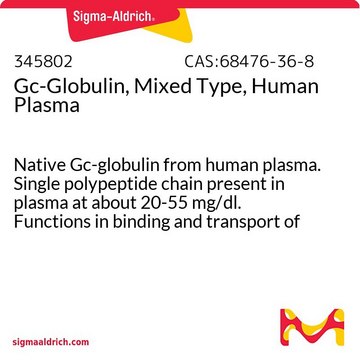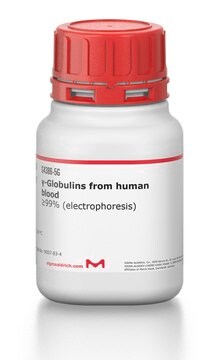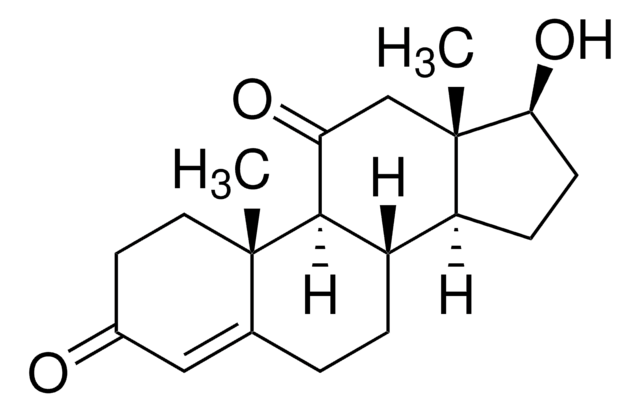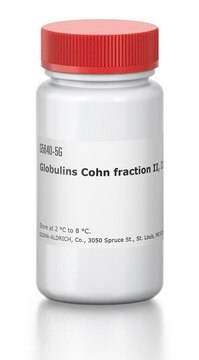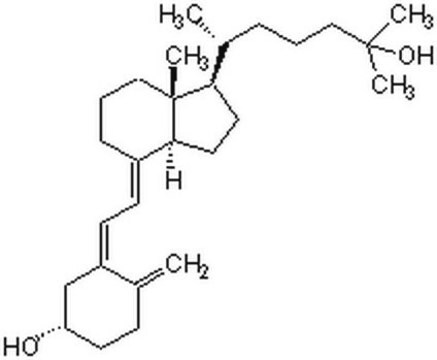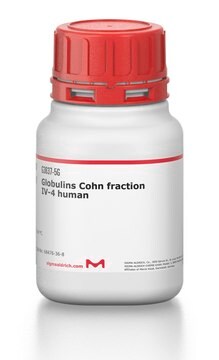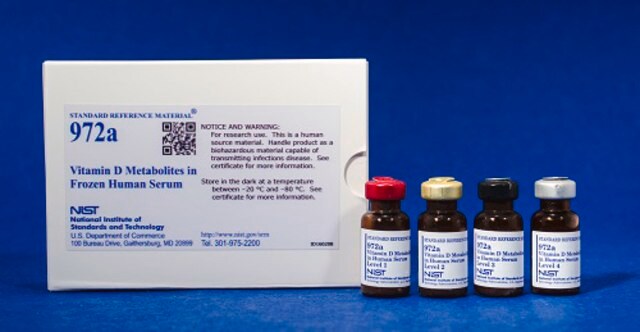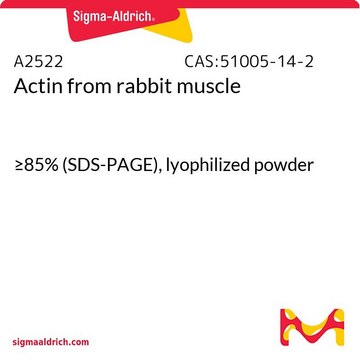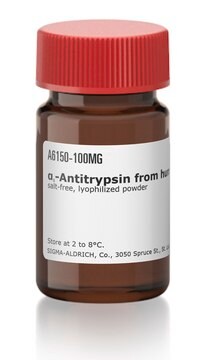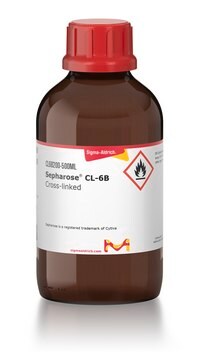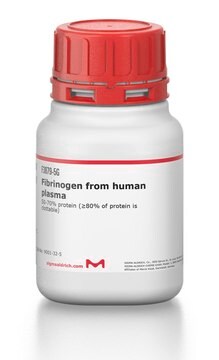G8764
Gc-globulin from human plasma
≥90% (SDS-PAGE), lyophilized powder (containing sodium chloride and sodium phosphate buffer salt)
Synonym(s):
DBP, Group-Specific Component, Vitamin D Binding Protein
Sign Into View Organizational & Contract Pricing
All Photos(1)
About This Item
Recommended Products
General description
Gc-Globulin, a member of the albumin superfamily, is the major plasma carrier of vitamin D and its metabolites. It is also, along with gelsolin, part of the extracellular actin scavenger system. Gc-globulin also binds monomeric actin (G-actin) with high affinity to scavenge actin released by necrotic cells, preventing its polymerization into filaments. Gc-globulin enhances the chemoattractant activity of C5a for inflammatory cells.
Gc-globulin from human plasma is encoded by the gene GC, which is mapped to human chromosome 4q13.3.
Gc-globulin or the vitamin D binding protein (DBP) is a 51-58 kDa multifunctional serum glycoprotein synthesized in large quantities by primarily in the liver. It is a member of the albumin gene family and has the characteristic multiple disulfide-bonded, triple domain structure.
Application
Gc-globulin from human plasma has been used:
- as a fluorescent probe for G-actin staining
- as a fluorescent probe to monitor steady-state rate of actin filament disassembly
- as a calibrator for liquid chromatography with mass spectrometry (LC-MS/MS)
Gc-globulin is a multifunctional, albumin-like plasma protein that often requires cell surface binding to mediate some of its diverse functions. It has been used to anlayze its glycosylation patterns.
Biochem/physiol Actions
Gc-Globulin, a member of the albumin superfamily, is the major plasma carrier of vitamin D and its metabolites. It is also, along with gelsolin, a part of the extracellular actin scavenger system. Gc-globulin also binds monomeric actin (G-actin) with high affinity to scavenge actin released by necrotic cells, preventing its polymerization into filaments. Gc-globulin enhances the chemoattractant activity of C5a for inflammatory cells.
Single nucleotide polymorphism in the gene GC is associated with deficiency of 25-hydroxyvitamin D [25(OH)D].
Preparation Note
Native Gc-globulin from human plasma
Disclaimer
RESEARCH USE ONLY. This product is regulated in France when intended to be used for scientific purposes, including for import and export activities (Article L 1211-1 paragraph 2 of the Public Health Code). The purchaser (i.e. enduser) is required to obtain an import authorization from the France Ministry of Research referred in the Article L1245-5-1 II. of Public Health Code. By ordering this product, you are confirming that you have obtained the proper import authorization.
Storage Class
11 - Combustible Solids
wgk_germany
WGK 3
flash_point_f
Not applicable
flash_point_c
Not applicable
Certificates of Analysis (COA)
Search for Certificates of Analysis (COA) by entering the products Lot/Batch Number. Lot and Batch Numbers can be found on a product’s label following the words ‘Lot’ or ‘Batch’.
Already Own This Product?
Find documentation for the products that you have recently purchased in the Document Library.
Customers Also Viewed
Cofilin-2 controls actin filament length in muscle sarcomeres
Kremneva E, et al.
Developmental Cell, 31(2), 215-226 (2014)
Acute homeostatic changes following Vitamin D2 supplementation
Berg AH, et al.
Journal of the Endocrine Society, 1(9), 1135-1149 (2017)
K Jie et al.
Journal of hypertension. Supplement : official journal of the International Society of Hypertension, 3(3), S145-S147 (1985-12-01)
Effects of exogenous and endogenous noradrenaline, released by tyramine and lower body negative pressure (LBNP), on vascular post-synaptic alpha 1- and alpha 2-adrenoceptors have been compared in healthy volunteers. Intra-arterial (i.a.) infusions of noradrenaline and tyramine into the forearm were
V F Rusiaev
Meditsinskaia tekhnika, (3)(3), 36-40 (1987-05-01)
A conductometric method for studying flowing blood coagulation is proposed. Phases of conductograms characterizing the kinetics and intensity of blood cells aggregation, release of biologically active compounds, fibrin formation, its mechanical properties, retraction process and fibrinolysis of clot are analysed
David Kessel et al.
Photochemistry and photobiology, 84(5), 1272-1276 (2008-06-03)
The proapoptotic effects of the Bcl-2 antagonist HA14-1 are believed to derive from its affinity for the hydrophobic groove on Bcl-2 and Bcl-x(L), thereby displacing proapoptotic factors, e.g. Bax and Bak. We have reported that HA14-1 promotes the efficacy of
Our team of scientists has experience in all areas of research including Life Science, Material Science, Chemical Synthesis, Chromatography, Analytical and many others.
Contact Technical Service